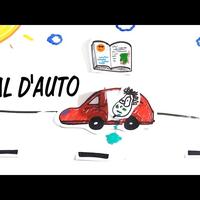Perchè ci vengono il MAL D'AUTO e il MAL DI MARE?
Why do we get car sickness and seasickness?
¿Por qué tenemos la ENFERMEDAD DEL COCHE y la ENFERMEDAD DEL MAR?
Pourquoi avons-nous le mal des transports et le mal des mers ?
Porque é que temos a DOENÇA DO CARRO e a DOENÇA DO MAR?
Allora, hai appena iniziato il tuo viaggio in macchina con alcuni amici, finché non
So, you've just started your road trip with some friends, until you
decidi di leggere un libro sui sedili dietro.
rozhodnete se přečíst knihu na zadních sedadlech.
you decide to read a book on the back seats.
postanawiasz poczytać książkę na tylnych siedzeniach.
Ma dopo aver letto solo qualche riga, hai le vertigini, ti senti stanco e nauseato.
Ale po přečtení jen pár řádků se vám točí hlava, jste unavení a naštvaní.
But after reading just a few lines, you feel dizzy, tired and nauseated.
Sémbra proprio il mal d'auto...
Sémbra jen nemoc z auta ...
Sémbra just the car sickness ...
La sorprendente verità è che ne soffre circa il 30% della popolazione, e di questi, più
The surprising truth is that about 30% of the population suffer from it, and more of these
del 66% lo prova in condizioni estreme.
66% test it in extreme conditions.
Tutto ciò si verifica nel momento in cui gli occhi e l'orecchio interno inviano segnali
To vše nastává, když oči a vnitřní ucho vysílají signály
All of this occurs when the eyes and inner ear send signals
Wszystko to dzieje się, gdy oczy i ucho wewnętrzne wysyłają sygnały
differenti al cervello.
different to the brain.
różni się od mózgu.
L'apparato vestibolare all'interno dell'orecchio contribuisce all'equilibrio e orientamento.
Vestibulární aparát v uchu přispívá k rovnováze a orientaci.
The vestibular apparatus within the ear contributes to balance and orientation.
Piccoli capelli all'interno del canale, individuano il movimento di un fluido al suo interno,
Malé chloupky uvnitř kanálu identifikují pohyb tekutiny v něm,
Small hairs inside the canal, identify the movement of a fluid inside it,
Małe włoski wewnątrz kanału, rozpoznają ruch płynu w jego wnętrzu,
permettendoti di orientarti.
allowing you to orient yourself.
pozwalając ci się orientować.
Se ti inclini sui lati, il liquido si muove e vengono inviati dei segnali al cervello.
If you lean to the sides, the liquid moves and signals are sent to the brain.
Jeśli pochylisz się na boki, płyn się porusza, a sygnały są wysyłane do mózgu.
Ma spesso, in macchina, in barca, o nei cinema IMAX, il tuo apparato vestibolare trasmette
un segnale differente ai tuoi sensi.
Nel caso dell'auto, gli occhi vedono che nella macchina è tutto fermo, in particolare quando
In the case of the car, the eyes see that everything is stationary in the car, especially when
W przypadku samochodu oczy widzą, że w samochodzie wszystko jest nieruchome, zwłaszcza gdy
fissi un libro, mentre le orecchie avvertono il movimento della macchina.
you stare at a book, while your ears sense the movement of the machine.
wpatrujesz się w książkę, a twoje uszy wyczuwają ruch maszyny.
Al contrario, nei cinema IMAX, gli occhi vedono un sacco di cose muoversi mentre le orecchie
non percepiscono più di tanto movimento.
they don't perceive much movement.
nie dostrzegają zbyt wiele ruchu.
Queste incongruenze di segnale dicono al cervello che c'è qualcosa che non va.
These signal inconsistencies tell the brain that something is wrong.
Te niespójności sygnałów mówią mózgowi, że coś jest nie tak.
E perché allora viene la nausea?
And why then does nausea come?
I dlaczego w takim razie pojawiają się nudności?
La teoria principale dice che, evolutivamente parlando, se i segnali in ingresso di orecchie
The main theory says that, evolutionarily speaking, if the input signals of ears
e occhi non corrispondono, è probabile che si sia ingerita una neurotossina.
and eyes do not match, it is likely that a neurotoxin was ingested.
Il miglior modo per sbarazzarsi di tutto ciò?
The best way to get rid of all of this?
Najlepszy sposób na pozbycie się tego wszystkiego?
Vomitare.
Vomit.
Era un metodo efficace fino all'avvento dei mezzi di trasporto moderni.
It was an effective method until the advent of modern means of transport.
Peccato che il cervello non ne abbia mai preso nota.
Škoda, že si toho mozek nikdy nevšiml.
Too bad the brain never took notice.
Szkoda, że mózg nigdy tego nie zauważył.

